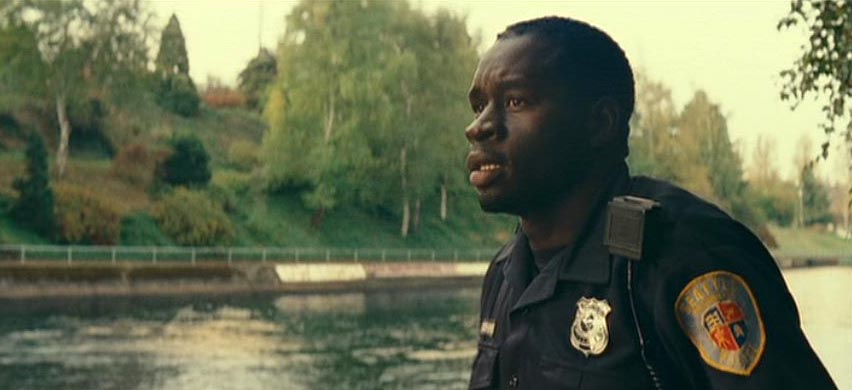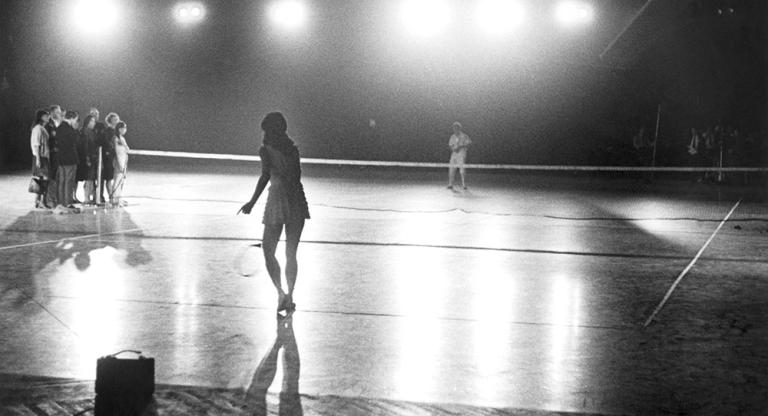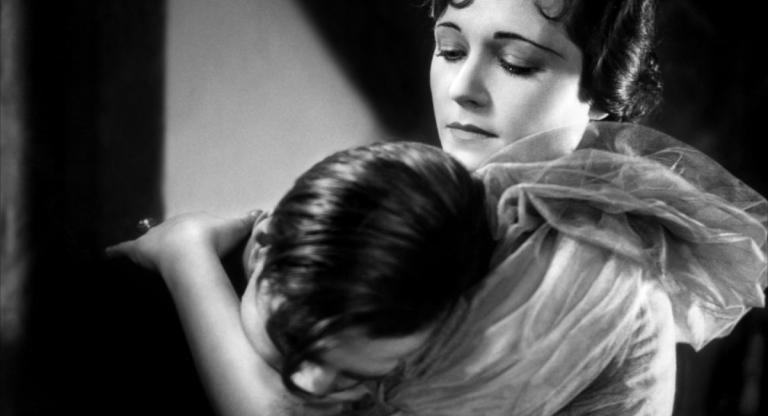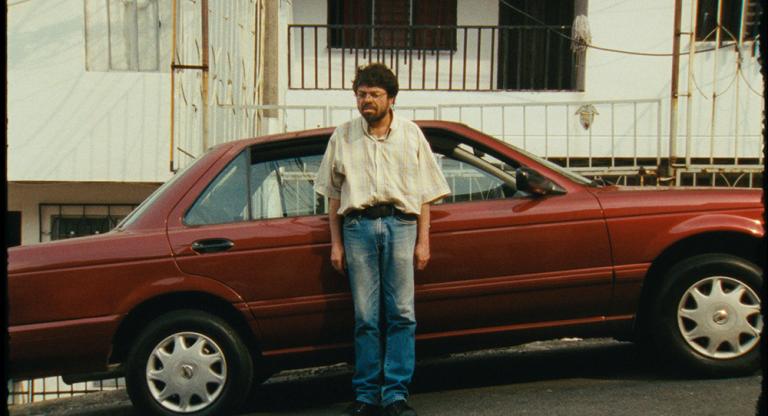Charles Mudede’s “Police Beat” column in The Stranger was already the stuff of alt-weekly legend years before Police Beat the film came out in 2005. Mudede spun oddball poetry out of the human happenstance of Seattle police blotters—a grand pageant spanning neighborly disputes, curious thefts, addled antics, and you-can’t-make-this-up stories of gunplay (or foreplay) that crop up during just another day on the beat.
Mudede joined forces with director Robinson Devor to craft the deadpan urban mosaic and patrolman portrait, which premiered in competition at Sundance (alongside Junebug, The Squid and the Whale, Hustle & Flow, and Brick) and had its New York theatrical run at Anthology Film Archives. “It’s enough of a feat to find genuinely new ways of rendering heartbreak and longing,” baby Rapold wrote at the time, “but Police Beat manages that and more. Gorgeously photographed and startlingly addictive, mesmerizing and mysterious, Robinson Devor’s unlikely-sounding triumph is a sensual immersion into the consciousness of a lovelorn Senegalese-American cop in Seattle.”
I still think that! And when e-flux’s online screening room featured another film written by Mudede—Zoo, a story about a notorious zoophile death, which I’ll have to write about separately at some point—it was a prime opportunity to revisit Police Beat, and Mudede. As senior staff writer at The Stranger, Mudede has continued to write about movies and aesthetics and politics—with departures into other subjects, such as in the immortal essay “Why Are People So Weird About Eating Bones? I Eat Them Whole.” He directed his first feature, Thin Skin (2020), as the pandemic began, and e-flux will publish a collection of essays, People of the Universe. With any luck, Police Beat (which is available to screen) will soon find new audiences.
Nicolas Rapold: How did Police Beat arise out of the column you were writing?
Charles Mudede: It was a confluence of things. Robinson Devor, who’s a film director who was initially based in Los Angeles and moved to Seattle, approached me about working on a film about an African boy soldier. We called it Superpower. We worked on it, and it went to the Sundance screenwriting lab. They liked the script a lot and really pushed for it to be made. And nobody would pick it up. Rob was really looking to start a new project. So he proposed a film while we were waiting for Superpower to get noticed or made: Why don't we go for private equity, get some local interest and some local money and local talent, and base a film on your column? I’d written that column since 1999. Like so much stuff that happened at The Stranger at the time, we would pick up a form and change it completely. You wouldn't call it a traditional police blotter. I didn’t focus on the kind of stuff the police like to emphasize to convince the public that they're protecting them, like a carjacking.
NR: How they caught someone and the situation was resolved.
CM: Yeah. Whereas I would use something where two lovers were fighting and one threw a bird cage at the other. And then I speculated about the bird in the cage, and that became the whole blotter. “What was the bird thinking?”
NR: POV: bird. There’s a poetry to the columns.
CM: I was drawing from my reading in literature and also continental philosophy. It tended to be a lot of Foucault, a lot of Nietzsche, a lot of modernist literature.
NR: I sometimes think of Dos Passos and what he does with news headlines in the U.S.A. Trilogy.
CM: Yeah, yeah. The column was popular in Seattle, and once in a while, there’d be a crime like somebody walking into a grocery store and eating red meat in public. I just love the image of just opening a packet of red meat and just chewing and chewing. So Rob collected all of the entries that he liked, and then together we structured it into a story. And then I brought in another element because I was really into Charlus, a character in Remembrance of Things Past by Proust. And in the famous first book, Swann’s Way, he goes through a terrible period of lovesickness with a young woman called Odette. He really gets sick, because she won't answer the door, she’s seeing another person, and what's going on? This goes on for hundreds of pages. There's a point when he finds lumps on his chest, and he hopes they’re cancerous so they’ll end the suffering. I wrote an essay about the dangers of lovesickness, and I sent that to Rob and said we should make a movie about a person who's going through this horrible experience.
We didn't make him creepy. He was too inward, too proud. He's not the sort to stalk. And he’s a police officer, so we tried to match all the crimes to his state of mind, the way it was deteriorating while she was away, while he's calling her and so forth. He's hardly a detective. He's not going to solve any of those crimes.
NR: The very first incident that “Z” responds to is a body floating in a lake. But then we cut to him and what he's thinking about is his girlfriend!
CM: [laughs] Sorry, it’s just stuff like that that I love so much. Seeing a corpse and thinking about your girlfriend who’s left town. You think it’s going to be a murder mystery, but one cop is worried about his girlfriend, the other cop is obsessed with the prostitute he notices. Nobody’s dealing with the murdered body in the water. The cops are both in love, but for different reasons. By the way, the other officer is called Swann.
NR: They’re not these perfect cops, nor are they renegades. These two, their minds are just elsewhere.
CM: Elsewhere all the time! In one scene the officer dumps a child who's been abandoned with the other police officer, to see his girl. You want to talk about a real Bad Lieutenant.
NR: It's like Average Lieutenant. Regular Lieutenant.
CM: Yeah. And I think that my film was closer to the truth here than Bad Lieutenant.
NR: So the idea was that each incident ends up reflecting his mental state.
CM: Yeah, that was in the script. When he gets there, he ends up talking about his emotional situation. That's what he sees in the crime. If it is a crime, but sometimes it's not. Sometimes it's somebody who thinks a criminal has done something awful in their backyard and finds out that it's only a tree branch. It's his state of mind that lets him see that: No, you have a dead tree in your yard. Because he’s feeling dead inside. But it caused a hell of a situation for the shoot.
NR: Because of all the locations?
CM: Everybody knows if you're making a film you’re supposed to cut down the location changes.
NR: And you're just adding more and more.
CM: More and more, and I don't know how anybody who worked on the project did not murder the director or eventually stab the writer. I give a lot of credit to the producers for pulling that off, because on the budget you had to run in a truck, look at the weather, shoot the scene, all of that. And all the crucial scenes were shot. I was waiting to see a lot of holes. Not at all.
NR: Was part of the idea to map out Seattle?
CM: If you're from Seattle, you’d think it's a bit of a mess in the film. If you don't know Seattle, it’ll look fine. You won't notice a difference. And most films depend on your ignorance. But when I made Thin Skin, I didn't have that many location changes. I was able to plot out the movie and make sure that the locations were consistent with what somebody in Seattle would recognize as right—where they're doing the work, where they're having drinks and so on. But Police Beat, there was no way we could do that.
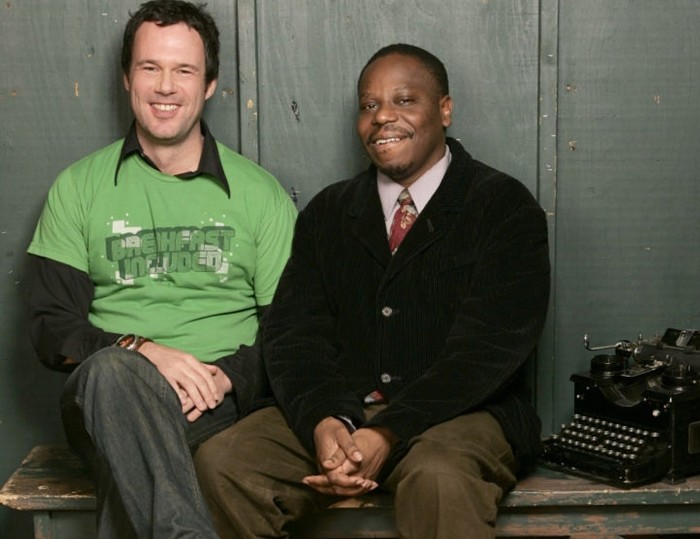
NR: I like the police blotter form as an anthology of ruptures in daily life. You're able to tap all these different situations, but each one doesn't become the whole drama. They're all pushed together.
CM: Yeah, they’re compressed. They're all real. At the time when we were writing the script, I'd written about four years’ worth of “Police Beats.” It used to be a weekly column. Rob [Devor] pored over them. A lot of people don't realize how much research goes into film. I was just thinking about Memories of Murder [2003], which is made roughly around the time of Police Beat. I think it operates in the same universe, if you look at the cops and their investigation. The ending [of Memories] is extraordinary because he ends up becoming a member of the middle class, in a rapidly industrializing modernizing career. What have I just watched? The serial killer is never caught! And you have to admire a film director who is willing to make fun of their culture. How they are more worried about eating soup and they yell at each other. [laughs]
NR: The voiceover in Police Beat is not in English, it’s in Wolof. Could you talk a bit about Z’s internal monologue and his identity as an immigrant?
CM: First of all, I'm an immigrant, and he was supposed to come from the English-speaking world. But the best actor we found turned out to be from Senegal, from West Africa, and he was in Seattle. [Pape Sidy Niang] was not a professional actor, but he was a natural. We couldn't believe our luck. The initial character came from a sort of Christian world, and he was a person coming out of the Muslim world. We went back to the script to make changes to fit his perspective. It was not too long after 9/11 and Islamophobia was at a high pitch. We both liked the idea of having a Muslim cop in Seattle. He'd be doing his prayers as he's policing the street.
He spoke Wolof, which is the main language in Senegal. One night Rob came to my apartment, and I was watching Playtime [1967]. And we smoked some pot, and I was like, Oh my god, is it the pot or is this just incredible? We sat there. We were editing at that moment. And I said to Rob—though I don't recommend using pot for inspiration—“You know what would be great is if we had subtitles but we did it backwards?” So I would write basically a poem, describing his inner world. And then I would go and say to him, “Read this in Wolof.” So when you're reading the subtitles, you're reading what came first, and then you're hearing it narrated. He was very good about making it match. And so we did a lot of work to make sure it was consistent and flowed well and felt like the words were coming from his mind.
And another thing I loved is it gave us enormous control over the subtitles. So if you see the way that we were placing them, they're not normal. Usually subtitles are super-functional, right, they pop up and leave. We could make the subtitle linger a little bit, and sometimes give it room and space. So we were completely manipulating the presentation.
NR: That reminds me of how Godard worked on his subtitles with his English-language subtitler.
CM: I always tell my students at Cornish College: “Never leave a stone unturned. Let the entire process be examined, manipulated. Don't worry about authenticity. Cheat, cheat, cheat.” Those subtitles don’t tell the truth, because that's not my concern. My concern is how does it come together and how does it feel? What is the impact, what is the story? Does it add another element to the total art?
NR: We also get some insight about how Z feels alienated generally. Like that scene with his supervisor in the car when he’s getting brushed off a bit.
CM: Yeah, and he says, “When do I get a patrol car?” And that's one of the advantages of being an African writer. I was laughing, because in Seattle, bike cops were thought to be really cool. Environmentally friendly, less aggressive. And I know that in Africa, bike cops are a lower order of cop! He’s like, I’m on a bicycle, I can’t call home to my family and say that. He wants to look good. If he has a police car, he can send a photo back home. “Oh look at him, he's doing very well.” You can’t send a photo of a mountain bike! [laughs]
NR: I feel like Police Beat has had an influence and has its descendants. I thought of it while watching a Sundance film recently, The Tuba Thieves [2023].
CM: You know, I watched the film recently, and I was really pleased with it, only because it really captured a moment in the Pacific Northwest. An increase in its diversity. I've always wanted it to reach a larger audience. I've always thought that there's a lot in that film that’s still important. There's a scene where he goes to a community college to do American government classes. He goes to Seattle Central, and Seattle Central was known as a hotbed of radical leftist activity. And his girlfriend was a member of that leftist radical circle. We don't say, but she may have just been uncomfortable with dating a cop. A police officer in the U.S.A. is not the same as a police officer in Africa.
And if I say I liked the film, it's not because I'm saying I'm great. It's because I see myself as completely different. It’s a film I made as a young writer. I would not be able to write a film like that at my age, because I have completely different influences at the moment.
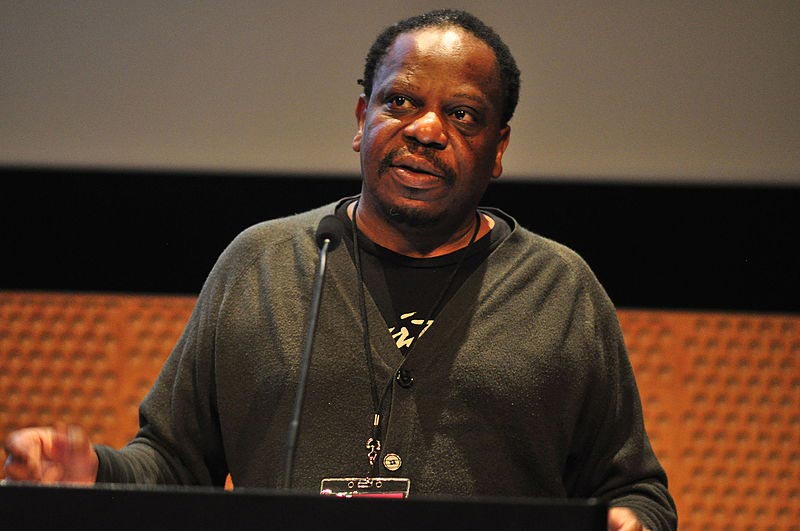
NR: Where are you at now?
CM: I'm much more of a Marxist than I was back then. There is a lot of stuff that would have changed. I was much more into the poststructuralists at that time. If you look at the film, I was into this story being not hung together so strictly—this notion in the postmodernist world that there is no master narrative. And I love this, I was really big into reading Derrida and Lyotard and all this stuff. The outside world comes in shocks, right? But I started reading heavily in Marx right around the time that I was done with Police Beat and read Das Kapital. Also combining that with the work of Fredric Jameson, who is an American cultural theorist. Those became really useful tools for thinking about the culture we’re in.
Just even think of Andor. The way they represent power in the galaxy, the way the Galactic Empire exerts its influence or its control of lives of people in different planets. And then somebody is arrested, he ends up in a prison system where they work and build parts, and it's like, This is interesting! This is worthy of a little Marxist analysis, right? Let's analyze that and think about the society we live in, which is a capitalist society, which has prisoners working, making things at very low wages. I mean, there's still an aesthetic element for me, which I haven't at all shaken. Even when I made my film, Thin Skin, I resorted much more to my aesthetic program, which is definitely still influenced by filmmakers such as Tarkovsky and Wong Kar Wai. And Proust is still there for me.
NR: Are there any recent movies that had you thinking along Marxist lines?
CM: I am drawn to what the popular audience is watching. I’m not big into superhero films, and it takes a lot of effort for me to watch one of them, but you have Infinity War [2018], right? And you basically have a person [Thanos] who's saying that there's too many people in the universe, and so we just got to kill a bunch of them, and that’ll restore order. The villain sounds like an environmentalist. But none of us are saying you have to kill people to restore environmental stability and end climate change! We are asking just to change. We can't continue to underwrite a system that has endless growth. You know, that’s where my Marxism comes in. I'm interested in using those tools to analyze what a lot of people are watching. When I write about arthouse films, I tend to talk more about the director and the way that they filmed.
NR: I was reading your reviews of Lav Diaz’s Norte, the End of History [2013] or Tsai Ming-liang’s Rebels of the Neon God [1992], and there you’re also doing a little socioeconomic analysis.
CM: Yes, I remember that technological change was on my mind, too, because that was a big inspiration for making Zoo. And that's another big part of my Marxist background: we look at technology and what it's doing and how it's used, sometimes in unexpected ways.
NR: How certain ideas become embedded in us through the things we consume.
CM: Yes, it’s a lot of little things. I mean, the biggest-selling vehicles are these huge, massive pickup trucks. People who don't need them at all—they don't work in construction. They’re not carrying anything! The load is almost always empty. And you're not going to break that down by saying, Oh, this guy who bought this pickup truck is in an eternal struggle with the capitalists. It falls apart! You have to figure out how in the world did you get to a point where going into debt is worth owning a vehicle, which for the most part is unused, difficult to park, and costly in gas. You have to sit down and think about the kind of society that you live in that someone finds fulfillment in such an extravagant waste of time, energy, of everything you could imagine. You can't say, Oh, they're hoodwinked by the capitalist, they don't know what they're doing or whatever. It's a little more complicated. Yes, there is class struggle, but you have to step back a little bit.
Roger & Me [1989] was to me a masterpiece of documentary, processing everything. Looking at cities falling apart, looking at how the crime is increasing, looking at people being evicted. Looking at their mental state. That, to me, exemplifies this Marxist position. We're going to look at these culture-wide effects, and we're going to figure out why we represent things in that way.
